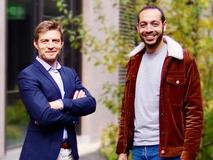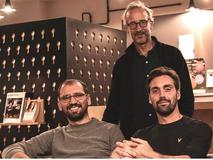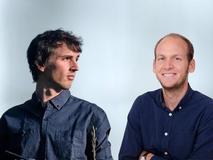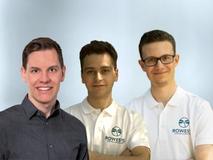Startups developing a novel drug delivery system, the next generation of AI assistants on mobile devices, mangrove planting as a service, AI tractor operator, and PET using the novel alpha-synuclein imaging tracer each win CHF 10,000
26.10.2022
ArtemiX Biotech, ClearSky, Inverto, Lonomy, and NeuroPAT win Venture Kick's first stage of financial and entrepreneurial support. Their project intends to prevent vessel stenosis and increase the primary patency success rate; aim at putting Switzerland at the forefront of a technology that allows a total paradigm shift in the way our personal data are processed; have developed a system that can precisely release mangrove seeds from drones, reducing planting costs and speeding up the process; making tractor fully autonomous; and exploit the potential of advanced imaging methods for identification of efficient biomarkers.
 |
 ArtemiX Biotech: CEO Laurent Vinet and CTO Nasreddine Kanfar
|
 ClearSky: from left to right, Stefano Zamuner, Laurent Vuillon, Hugo Flayac
|
 Inverto: CTO Cameron Dowd and CEO Juerg Germann
|
 Lonomy: CEO Pascal Lieberherr, CTO Gian Erni, and Lead Software Engineer Timo Schönegg
|
 NeuroPAT: CEO Ruiqing Ni
|
ArtemiX Biotech: a novel drug delivery system to prevent stenosis
Arteriovenous fistula (AVF) or arteriovenous graft (AVG) are routinely conducted to enable hemodialysis for patients with kidney failure. Around 100,000 AVFs and 60,000 AVGs are carried out annually alone in the US. Postop complications - such as infection, blood clots, and narrowing of the vessel are common and frequently (50%) lead to access failure. To restore function, patients often undergo one to three maintenance procedures per year, resulting in significant disruptions to critical hemodialysis care and increased costs to the healthcare system.
ArtemiX is a novel, patented drug delivery system for the local sustained release of an active drug intended to prevent stenosis of bypass surgery and arteriovenous fistula (AVF). Postoperative complications (stenosis, occlusions), occur in up to 50% of the cases, leading to intimal hyperplasia, lumen narrowing, and access failure, associated with increased morbidity, mortality, and healthcare costs. ArtemiX intends to prevent vessel stenosis and increase the primary patency success rate. The consortium gather an interdisciplinary team of Swiss partners possessing the required expertise in medicine (CHUV), vascular biology (CHUV), drug delivery devices, and biomaterials (UNIGE): Artemix Project Leader and CEO Dr. Laurent Vinet, CTO Dr. Nasreddine Kanfar, Product dev Chem Dr. François Saucy Head of the Vascular Surgery Department at the Ensemble Hospitalier de la Côte, Dr. Olivier Jordan, a senior lecturer at the School of Pharmacy at UNIGE, and Dr. Florence Delie, a pharmacist, whose research focuses on the development of drug delivery systems. Based on 25 interviews, customers will be vascular surgeons or nephrologists who are the decision-makers. The beneficiary customers will be the hemodialyzed patients. The total addressable market of ArtemiX is evaluated between CHF 1 to 1.5 billion per year.
The funds of Venture Kick will allow them to finance part of a proof of concept study in a big animal before evaluating their product in Humans. The funds will also allow them to attend some networking and congresses devoted to startups.
ClearSky: the next generation of Ai assistants on mobile devices through privacy by design
Voice conversation is still considered the most direct, efficient, and natural communication channel even in the messaging app era. It remains the CEOs, executives, and consultants' preferred choice when reaching out to partners, clients, and lawyers… for exchanging quick and key information requiring some level of confidentiality. During calls, key information is exchanged about strategy, organization, competition, planning, deliverables, and to-dos. Beyond a few calls per day, it becomes harder and harder to keep track and every forgotten item might result in lost opportunities. On the opposite side, remembering everything from conversations conveys professionalism and trust. Even people with superior memories forget things and in essence, can’t remember what they don’t remember.
Nowadays voice conversations can be significantly augmented by modern deep-learning algorithms. However natural speech understanding (NSU) models are extremely computationally heavy. They require expensive cloud architectures relying on remote servers exposed to security breaches and latency and which have a large carbon footprint. ClearSky develops Private, Proactive, and Personalized apps based on Edge Ai technology. They optimize and compress deep learning models to make them fit locally on mobile devices. The Ai engine learns from the user at her/his exclusive service for a fully personalized experience with no cloud-server interaction. The team is composed of three co-founders: Dr. Hugo Flayac, Pr. Laurent Vuillon and Dr Stefano Zamuner and, two scientific advisors: Pr. Jean-Philippe Thiran, an EPFL world-renowned Machine Learning Expert, Scientific Advisor Dr. Petr Motlicek IDIAP, a world-renowned Speech Processing Expert.
The Venture Kick funds will be used for market analysis, digital marketing, and communication supporting the beta campaign of their first mobile app “CallEdge”.
Inverto: automating mangrove restoration to speed-up carbon capture
Lonomy: making tractors fully autonomous
Farmers struggle to find skilled tractor operators - there is a heavy labor shortage. Farmers have to perform repetitive tasks which forces them to spend countless hours on the tractor. In addition, the more sustainable approach requires more tractor hours per hectare. Thus, farmers shy away from organic approaches. In an apple orchard for example spraying is done approx. 25 times and mulching 7 times per season.
Lonomy solves this pain by making orchard tractors fully autonomous. The team - composed of founders CEO Pascal Lieberherr, CTO Gian Erni, merit-based ETH scholarship, and Lead Software Timo Schönegg, - use existing tractors and provide the sensors and software to make them 100% autonomous. Their target customer, a 40-ha apple orchard farmer in the canton of Thurgau in CH, would save CHF 30k per season with an autonomous tractor from Lonomy. Since the startup relies on a vision-based approach, their solution is cost-effective - no need for expensive sensors. Their technology is based on two innovations. First, the sensor fusion algorithm for precise localization. It relies on GPS and cameras. Compared to other solutions, localization is more reliable and can guarantee the precision needed, even when the GPS signal is absent, which happens in orchards. Second, their software enables the vehicle to understand if the path is safe or if an anomaly is present. In such cases, the tractor stops and notifies the farmer. The combination of checking if the path is safe together with the precise localization makes their innovation unique. Their total addressable market worldwide just for spraying in orchards is estimated at USD 14 Billion.
They will use the Venture Kick funds to have demonstrated the technology to farmers, tractor manufacturers, and dealers. lonomy.ethz.ch
NeuroPAT: exploit the potential of advanced imaging methods for the identification of efficient biomarkers
Parkinson‘s disease is one of the most common types of dementia affecting 10 million people worldwide. The accuracy of Parkinson's disease diagnosis is around 70%. The current imaging biomarker only detects the disease at a rather late stage. There is an unmet need for early and differential diagnosis of Parkinson’s disease. Alpha-synuclein inclusion is the toxic protein aggregate, considered as the culprit of Parkinson's disease. PET using the novel alpha-synuclein imaging tracer provides a unique opportunity for diagnostic breakthrough.
NeuroPAT aims to address this unmet need by developing PET alpha-synuclein imaging tracer to assist the Parkinson's disease diagnosis and to precisely evaluate the effects of therapies on alpha-synuclein. Their main product is a alpha-synuclein imaging biomarker for Parkinson's disease (radiolabeled small molecules, with the potential to include a related imaging analysis service package). NeuroPAT's Founder is Dr. Ruiqing Ni from UZH, CSO is Dr. Banala Srinivas from RWTH Aachen, and CMO is Dr. Anton Gietl, clinician from UZH/USZ. Successful implementation of this project implies a new imaging tracer, and new chemical entities IP. Upon the success of the proposed project, the developed PET imaging ligand will be ready for human application with PET imaging. Alpha-synuclein biomarker has strong commercial potential for radiopharmaceutical as well as companies with Parkinson‘s disease drug pipeline. The potential market is estimated at 10 million Parkinson's disease patients worldwide, representing a CHF 300 M annual market in 2025 with a growth rate of 20%. There is no FDA/EMA approved alpha-synuclein PET tracer for Parkinson's disease.
The team plans to use the Venture Kick funds for patent application, toxicity study, CMC, regulatory cost, marketing, and salaries.
Arteriovenous fistula (AVF) or arteriovenous graft (AVG) are routinely conducted to enable hemodialysis for patients with kidney failure. Around 100,000 AVFs and 60,000 AVGs are carried out annually alone in the US. Postop complications - such as infection, blood clots, and narrowing of the vessel are common and frequently (50%) lead to access failure. To restore function, patients often undergo one to three maintenance procedures per year, resulting in significant disruptions to critical hemodialysis care and increased costs to the healthcare system.
ArtemiX is a novel, patented drug delivery system for the local sustained release of an active drug intended to prevent stenosis of bypass surgery and arteriovenous fistula (AVF). Postoperative complications (stenosis, occlusions), occur in up to 50% of the cases, leading to intimal hyperplasia, lumen narrowing, and access failure, associated with increased morbidity, mortality, and healthcare costs. ArtemiX intends to prevent vessel stenosis and increase the primary patency success rate. The consortium gather an interdisciplinary team of Swiss partners possessing the required expertise in medicine (CHUV), vascular biology (CHUV), drug delivery devices, and biomaterials (UNIGE): Artemix Project Leader and CEO Dr. Laurent Vinet, CTO Dr. Nasreddine Kanfar, Product dev Chem Dr. François Saucy Head of the Vascular Surgery Department at the Ensemble Hospitalier de la Côte, Dr. Olivier Jordan, a senior lecturer at the School of Pharmacy at UNIGE, and Dr. Florence Delie, a pharmacist, whose research focuses on the development of drug delivery systems. Based on 25 interviews, customers will be vascular surgeons or nephrologists who are the decision-makers. The beneficiary customers will be the hemodialyzed patients. The total addressable market of ArtemiX is evaluated between CHF 1 to 1.5 billion per year.
The funds of Venture Kick will allow them to finance part of a proof of concept study in a big animal before evaluating their product in Humans. The funds will also allow them to attend some networking and congresses devoted to startups.
ClearSky: the next generation of Ai assistants on mobile devices through privacy by design
Voice conversation is still considered the most direct, efficient, and natural communication channel even in the messaging app era. It remains the CEOs, executives, and consultants' preferred choice when reaching out to partners, clients, and lawyers… for exchanging quick and key information requiring some level of confidentiality. During calls, key information is exchanged about strategy, organization, competition, planning, deliverables, and to-dos. Beyond a few calls per day, it becomes harder and harder to keep track and every forgotten item might result in lost opportunities. On the opposite side, remembering everything from conversations conveys professionalism and trust. Even people with superior memories forget things and in essence, can’t remember what they don’t remember.
Nowadays voice conversations can be significantly augmented by modern deep-learning algorithms. However natural speech understanding (NSU) models are extremely computationally heavy. They require expensive cloud architectures relying on remote servers exposed to security breaches and latency and which have a large carbon footprint. ClearSky develops Private, Proactive, and Personalized apps based on Edge Ai technology. They optimize and compress deep learning models to make them fit locally on mobile devices. The Ai engine learns from the user at her/his exclusive service for a fully personalized experience with no cloud-server interaction. The team is composed of three co-founders: Dr. Hugo Flayac, Pr. Laurent Vuillon and Dr Stefano Zamuner and, two scientific advisors: Pr. Jean-Philippe Thiran, an EPFL world-renowned Machine Learning Expert, Scientific Advisor Dr. Petr Motlicek IDIAP, a world-renowned Speech Processing Expert.
The Venture Kick funds will be used for market analysis, digital marketing, and communication supporting the beta campaign of their first mobile app “CallEdge”.
Inverto: automating mangrove restoration to speed-up carbon capture
Mangrove ecosystems are globally significant sources of biodiversity, have social benefits to neighboring communities, and are highly effective at carbon capture (capable of storing 3 to 4 times more carbon than other tropical forests). At today’s carbon prices, mangrove restoration has the potential to be a USD 11.1 billion industry over the next 25 years, currently held back by the high costs of mangrove restoration projects. A significant component of mangrove restoration costs is the manual and labor-intensive planting and monitoring process, typically in environments that are difficult to access terrestrially. Mangrove seeds are also very varied in their geometries and dimensions, which prevents existing automated solutions from being used. The difficulties in monitoring and verification of restoration projects also limit the opportunities for the sale of carbon credits.
Inverto aims to automate mangrove restoration as a service for mangrove restoration groups. There are currently over 800'000 hectares of mangroves that are highly viable for restoration. The team composed of CEO Dr. Jürg Germann, Ph.D. in soft robotics from EPFL, and CTO Cameron Dowd, MSc Mechanical Engineering EPFL, have developed a system that can precisely release mangrove seeds from drones, reducing planting costs and speeding up the process. Their solution uses soft robotics to manipulate the difficult geometries of mangrove propagules and plant mangroves from drones. Through automated sampling techniques for project monitoring, their approach reduces the costs associated with certification and carbon traceability, as well as quantifies the biodiversity impact generated. The involvement of local communities ensures the long term sustainability and robustness of the restoration.
Inverto plans to use the Venture Kick financing to further develop its business case, further refine its prototype to bring it to a level ready for extended field trials, and conduct pilot projects with various partners to investigate the real-world economics of its solution compared to existing methods, as well as generate academic publications on its approach’s environmental impact with long term monitoring. This data will be essential to look for further funding to industrialize its technology and allow them to present a well-tested use case to its clients or investors. www.inverto.techLonomy: making tractors fully autonomous
Farmers struggle to find skilled tractor operators - there is a heavy labor shortage. Farmers have to perform repetitive tasks which forces them to spend countless hours on the tractor. In addition, the more sustainable approach requires more tractor hours per hectare. Thus, farmers shy away from organic approaches. In an apple orchard for example spraying is done approx. 25 times and mulching 7 times per season.
Lonomy solves this pain by making orchard tractors fully autonomous. The team - composed of founders CEO Pascal Lieberherr, CTO Gian Erni, merit-based ETH scholarship, and Lead Software Timo Schönegg, - use existing tractors and provide the sensors and software to make them 100% autonomous. Their target customer, a 40-ha apple orchard farmer in the canton of Thurgau in CH, would save CHF 30k per season with an autonomous tractor from Lonomy. Since the startup relies on a vision-based approach, their solution is cost-effective - no need for expensive sensors. Their technology is based on two innovations. First, the sensor fusion algorithm for precise localization. It relies on GPS and cameras. Compared to other solutions, localization is more reliable and can guarantee the precision needed, even when the GPS signal is absent, which happens in orchards. Second, their software enables the vehicle to understand if the path is safe or if an anomaly is present. In such cases, the tractor stops and notifies the farmer. The combination of checking if the path is safe together with the precise localization makes their innovation unique. Their total addressable market worldwide just for spraying in orchards is estimated at USD 14 Billion.
They will use the Venture Kick funds to have demonstrated the technology to farmers, tractor manufacturers, and dealers. lonomy.ethz.ch
NeuroPAT: exploit the potential of advanced imaging methods for the identification of efficient biomarkers
Parkinson‘s disease is one of the most common types of dementia affecting 10 million people worldwide. The accuracy of Parkinson's disease diagnosis is around 70%. The current imaging biomarker only detects the disease at a rather late stage. There is an unmet need for early and differential diagnosis of Parkinson’s disease. Alpha-synuclein inclusion is the toxic protein aggregate, considered as the culprit of Parkinson's disease. PET using the novel alpha-synuclein imaging tracer provides a unique opportunity for diagnostic breakthrough.
NeuroPAT aims to address this unmet need by developing PET alpha-synuclein imaging tracer to assist the Parkinson's disease diagnosis and to precisely evaluate the effects of therapies on alpha-synuclein. Their main product is a alpha-synuclein imaging biomarker for Parkinson's disease (radiolabeled small molecules, with the potential to include a related imaging analysis service package). NeuroPAT's Founder is Dr. Ruiqing Ni from UZH, CSO is Dr. Banala Srinivas from RWTH Aachen, and CMO is Dr. Anton Gietl, clinician from UZH/USZ. Successful implementation of this project implies a new imaging tracer, and new chemical entities IP. Upon the success of the proposed project, the developed PET imaging ligand will be ready for human application with PET imaging. Alpha-synuclein biomarker has strong commercial potential for radiopharmaceutical as well as companies with Parkinson‘s disease drug pipeline. The potential market is estimated at 10 million Parkinson's disease patients worldwide, representing a CHF 300 M annual market in 2025 with a growth rate of 20%. There is no FDA/EMA approved alpha-synuclein PET tracer for Parkinson's disease.
The team plans to use the Venture Kick funds for patent application, toxicity study, CMC, regulatory cost, marketing, and salaries.


